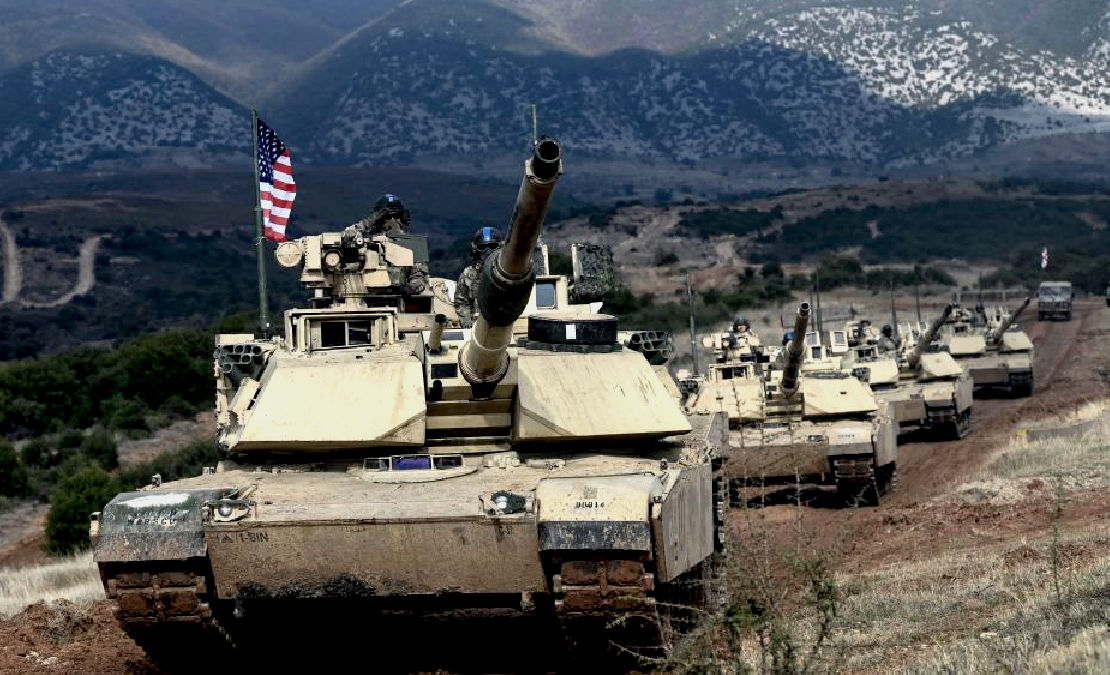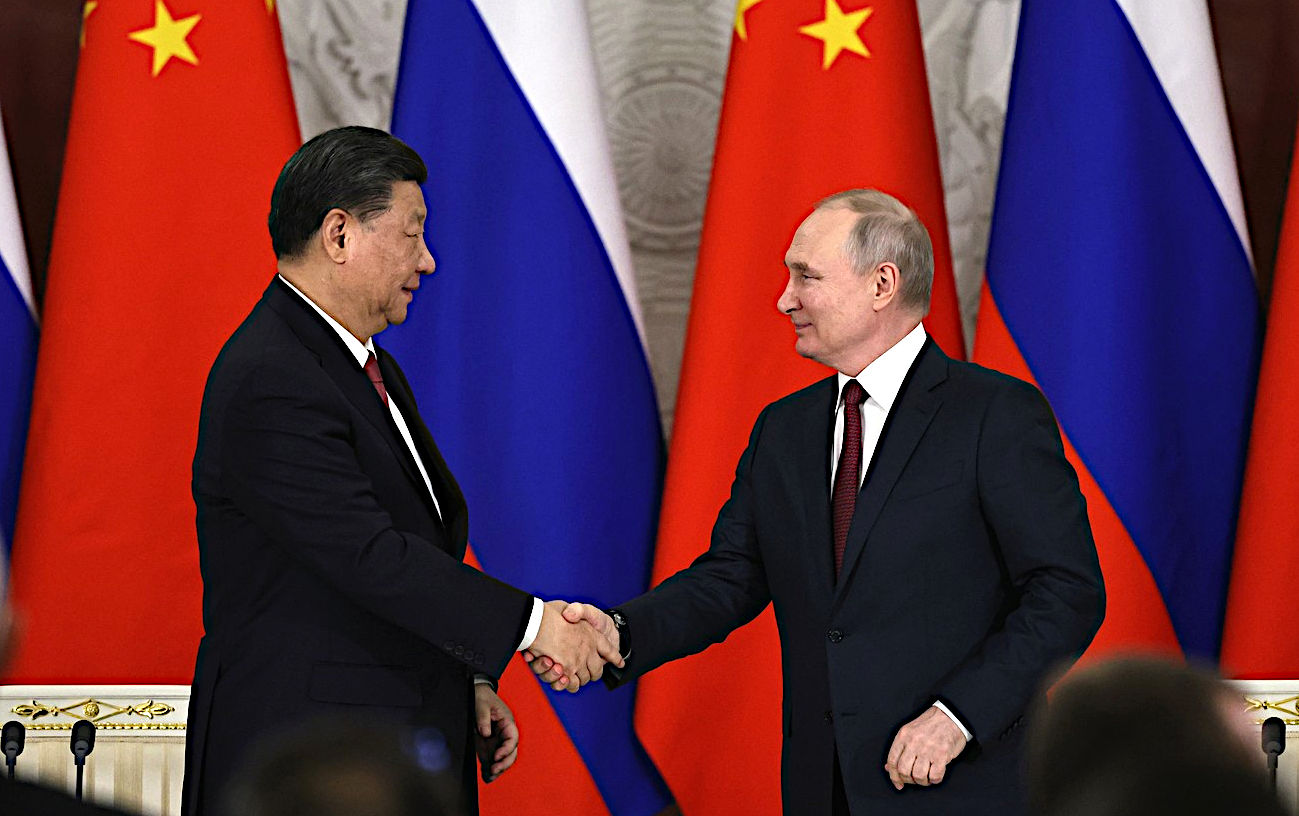
China
has a long established relationship with Russia, to include
satellites for space wars, apart from the import of cheap
fossil fuels, to underpin a massive building programme that
would end in tears, and bankruptcy. China has been lending
money to strategic projects such as port developments, all
over the world, as part of their expansion and export drive.
They have also invested in wind turbine generation to allow
for such loans.
What
is worse, a nation that openly invades another country, or a
nation that slowly creeps up on other nations in stealth
fashion. But takes over their economy and eventually, the
ownership of key assets, regardless, in tandem, building up
their military machine and fostering alliances with other
communist or dictator nations, such Russia, Iran and North
Korea.
One
major point to consider, is the poor economic performance
within their own country. The glaring example is the
Evergrande liquidation, where investors lost their shirts.
COMMUNIST
CHINA IN DEEP FINANCIAL TROUBLE, CAUSING HAVOC FOR THE FREE
WORLD
DAILY EXPRESS 11 APRIL 2024 - CHINA'S ECONOMY 'IMPLODING' AS EXPERTS ISSUE WARNING OF CHAOS AROUND THE GLOBE
China's economy is "imploding" and this could have huge repercussions around the globe, an expert has warned.
Uday Kotak, the founder of Kotak Mahindra Bank, says this will have an especially salient impact on the US economy ahead of this year's election.
He said on X: "US inflation is higher than expected. Postpones US rate cuts to later, closer to US Presidential elections, if at all. Brent oil is now $90. Will keep rates higher for longer worldwide including India. Only wild card: China imploding economically. Get ready for global turbulence."
China has faced several problems with its economy in recent years.
At the centre of the crisis is the country's ailing housing market, sparked by the collapse of property giant Evergrande after it accrued $300 billion in debt and was unable to make the interest.
Stagnation has also resulted in a stock market crisis and increasing unemployment, leaving ordinary Chinese people in a more precarious position.
Longer term, China also faces the threat of a rapidly ageing population.
Fitch Ratings Inc., an American credit rating agency, has dropped its sovereign credit outlook for China from stable to negative.
They said: "Wide fiscal deficits and rising government debt in recent years have eroded fiscal buffers from a rating perspective."
Fitch added that there are "increasing risks" to public finances as a result of the crisis in the property market.
Beijing has challenged Fitch's analysis, saying that its methodology failed to "reflect the positive role of China's fiscal policy in promoting economic growth and stabilizing the macro-leverage ratio," or an economy's debt relative to Gross Domestic Product (GDP).
Economist George Magnus, associate at the University of Oxford China Centre, told Newsweek how China's economy could be impacted by Fitch's ratings.
He said: "If the rating did get lowered in future, that would of course impact China's borrowing costs.
"It's not going to cause Beijing to deviate from Xi's emphasis on high-quality development or investment in new productive forces, but it serves notice that the pursuit of these campaigns isn't a given if the economy, as Fitch believes, is stressed by lower growth, weak demand, and macro imbalances."
[The burning question is, was this over-heating of the property company, deliberate? Over capacity for cheap exports/imports is another example of the rest of the world falling into the trap of giving business to a country they thought was benign, only to realise too late, that they are the enemy. Communists, working with Russia to spread their dictator politics to overrun the democratic free
world. The cure: Do not do business with communist regimes.
No matter how cheap their goods. This is a message to all
those clever chumps, out to make billions. In the process
raping their own nations. Better to manufacture locally, to
avoid World War Three,
and the deaths of millions of loved ones. Xi Jinping knows
exactly what he's doing. He is morally bankrupt, as well as
ruining world economics.]
THE EVERGRANDE FIASCO:
HUI KA YAN INVESTIGATION
A Hong Kong court has ordered the liquidation of the Evergrande Group, China's giant and massively indebted real estate developer, after the company was unable to restructure the $300
billion it owed investors.
Just six years ago, Evergrande was riding high, preselling apartments to
middle - and upper-income Chinese. In 2018, it was listed as the world's most valuable real estate company. But just three years later, it was on the financial ropes. Massively overleveraged and unable to complete some existing projects, Evergrande has become symbolic of a
Chinese economy that faces some major near-term obstacles: slowing growth, increasing debt and a shrinking workforce.
Evergrande had been seeking a $23 billion debt restructuring plan, but that fell apart last year when the company's billionaire CEO, Hui Ka Yan, also known as Xu Jiayin — once one of Asia's richest people — came under investigation for unspecified criminal behavior.
China invests roughly 20% to 30% of gross domestic product annually in the economy's property and infrastructure sectors.
Although Evergrande's demise is unlikely to have an immediate impact on U.S. consumers, it is yet another indicator that China's economy — which makes up about 20% of the world's GDP — is undergoing a painful period of slowdown, and that could result in slower global growth down the road.
HERE ARE SOME IMPORTANT THINGS TO CONSIDER
Evergrande's collapse is a big deal, but it's not another Lehman Brothers.
Some are already comparing Evergrande's likely demise to the 2008 collapse of Lehman Brothers, which presaged the Great Recession. The financial giant Lehman filed for bankruptcy on Sept. 15, 2008, with $613 billion in debt, triggering a banking meltdown that sent the already recessionary U.S. economy into a tailspin.
The dramatic fall of Lehman was due in large part to millions of risky mortgages propping up an unstable financial system. Homebuyers with mortgage payments they couldn't afford defaulted on their loans, sending shock waves through Wall Street and leaving those borrowers vulnerable to foreclosure.
vergrande has been on a slow burn to insolvency since at least 2020, when the Chinese government launched a program, known as the "three red lines," aimed at deleveraging the real estate market. Recognizing that this sector was overheated, Beijing placed restrictions on how much it could borrow.
"It worked," says Dexter Roberts, director of China affairs at the Mansfield Center at the University of Montana. "Evergrande has been the biggest victim of that policy."
But parallels with the collapse of Lehman, which was carrying $613 billion in debt (in 2008 dollars), are "a bit of an overstatement," says Roberts, who is also a senior fellow at the Atlantic Council's Global China Hub and the author of The Myth of Chinese Capitalism: The Worker, the Factory, and the Future of the World.
He calls the company's demise "a controlled implosion."
"China has known for a long time that their economy was imbalanced and too reliant on debt, with the real estate sector the most indebted industry of all and Evergrande the poster child for the most indebted company in that sector."
Scott Kennedy, senior adviser and trustee chair in Chinese business and economics at the Center for Strategic and International Studies, agrees that Evergrande's collapse should come as no surprise to its investors or to the rest of the world.
He says that Evergrande's business model, like that of other real estate developers in China, is pre-sold housing — an inherently risky strategy. It has led hundreds of thousands of Chinese to buy homes that now have no timeline — and perhaps no hope — of ever being completed.
"At some point, you may not be able to actually complete all of that housing. ... Eventually projects get bogged down and your financing situation gets worse," Kennedy says.
Chinese households have 70% or more of their asset wealth in their apartments. Evergrande's collapse, although long anticipated, comes as a blow to some, says Roberts.
Another smaller Chinese property developer, Country Garden, also recently got in trouble.
"They're very worried. They're seeing their one big asset depreciating," he says.
"They own their apartment, and in some cases more than one," he says. "When the property market is doing as badly as it's doing in China ... there's sort of a negative wealth effect for consumers and they don't want to spend."
The drawn-out liquidation of Evergrande means ordinary investors who just wanted to buy an apartment and larger institutional investors
"are going to need to stand in line, and the courts are going to have to figure out who is going to be at the head of that line and get paid," Kennedy
is quoted as saying.
BROADER CONCERNS FOR THE CHINESE ECONOMY
Beijing has come to recognize that an export-led economy on the scale that China has built in recent decades cannot go on forever, and it has tried to promote more domestic consumption to take up some of the slack.
However, the implosion of Evergrande could prove a blow to confidence both inside and outside
China, Kennedy says. "There is the confidence about the company itself and the financial problems that it's gotten into and what that means for the real estate sector," he says.
"The next is what is people's confidence in the Chinese government's ability to manage this process in a fair, dispassionate, objective way," he says.
Choyleva and others see the potential for deflation ahead as the Chinese economy struggles with a number of issues going forward. In November, consumer prices in China fell at their fastest rate in three years.
China "should be on American's radar because, first of all, China is a huge economy," she says. "If China is having severe deflation at home, pretty much the only choice left would be [for it] to export deflation."
At first glance, that would seem to benefit consumers buying Chinese-made goods. Instead, it's more likely to mean that U.S.-based competitors will need to lower their prices to compete with a flood of ever-cheaper Chinese products.
"That translates into businesses closing, jobs being lost and consumers being worse off," Choyleva says.
Roberts sees similar concerns. The U.S. and China, he says, "are deeply entwined," and most top U.S. multinationals "secure a significant portion of their revenues and profits from the China market or their supply chains start there."
Meanwhile, China is pumping money into manufacturing to try to offset its slowing economy.
"Ultimately, [China] is going to be producing a lot of goods that they need to sell somewhere, and they're going to be selling them on the cheap. So I would imagine [that] could be a deflationary force."
No wonder China is investing overseas. It is a move to try to ensure they can continue to sell their cut-price products, to fuel international expansionism.
To stop them taking over the world, we must stop importing their cheap products. Tesla, is one example of a company that is helping China to take over the world. Nice one Elon!
DOMESTIC
SLOWDOWN
A domestic slowdown in China, fueled by the Evergrande crisis and other factors, could have significant ripple effects across the globe. Here's a breakdown of the potential impacts:
Global Economic Slowdown:
Reduced Demand: China is a major consumer of raw materials and goods. A slump in its economy could lead to decreased demand for exports worldwide, impacting manufacturers and commodity producers globally.
Financial Market Turmoil: Evergrande's troubles raise concerns about the stability of China's financial system. If the crisis spills over to other Chinese financial institutions, it could trigger panic in global markets, leading to stock market crashes and capital flight.
Strained Supply Chains:
Production Slowdown: China is a major manufacturing hub. A domestic slowdown could disrupt production lines and lead to shortages of goods globally, impacting consumers and businesses alike.
Shipping Disruptions: China plays a crucial role in global shipping. Economic troubles could lead to port congestion and disruptions in shipping routes, further hindering global supply chains.
Debt Crisis Contagion:
Emerging Market Vulnerability: Many developing countries are heavily indebted to China. If China's economy weakens, it might be less willing or able to extend new loans or forgive existing debt. This could trigger a debt crisis in vulnerable emerging economies.
Global Recession Risk: The combined effects of a slowdown in China, financial market turmoil, and supply chain disruptions could lead to a global recession.
Geopolitical Implications:
Internal Tensions: A domestic economic crisis could lead to social unrest and political instability within China. This could distract the Chinese government from foreign policy issues and potentially lead to a more assertive or aggressive stance to deflect attention from internal problems.
Weakened "Belt and Road Initiative" (BRI): China's ability to finance its ambitious BRI infrastructure projects could be hampered by a domestic slowdown. This could impact countries relying on BRI investments for development.
However, it's important to consider some mitigating factors:
China's Size and Resilience: China's large domestic market and government control over the economy give it some buffer against a full-blown economic collapse.
Global Policy Response: Central banks and governments around the world might take coordinated action to mitigate the crisis and stimulate their own economies.
Regarding a Chinese "takeover" of the world:
Unlikely Scenario: A complete global takeover by China is highly improbable. The world is multipolar, with other major powers like the US and the EU still wielding significant economic and military influence.
Focus on Cooperation: Despite the current tensions, global prosperity relies on cooperation between major economies. A complete breakdown would be detrimental to all parties involved.
In conclusion, a domestic slowdown in China could have significant negative impacts on the global economy. However, the severity of the impact will depend on the depth of the crisis and the international community's response. While a complete Chinese takeover is unlikely, close attention needs to be paid to how China navigates its economic challenges to ensure a stable and prosperous global order.
THE NEW SILK ROAD: A TROJAN HORSE OR MUTUALLY BENEFICIAL TRADE?
The traditional image of conquest involves tanks rolling across borders and soldiers raising flags. However, China's rise as a global power presents a new twist: the possibility of a "stealth invasion" through economic influence. This essay will explore China's Belt and Road Initiative (BRI), its methods, the ethical considerations, and how nations can navigate this complex landscape.
The BRI, often referred to as the "New Silk Road," is a massive infrastructure development and investment program launched by China in 2013. Through a network of land and maritime routes, China aims to connect with countries across Asia, Africa, Europe, and beyond. This involves building railways, roads, ports, and other infrastructure projects, often financed with Chinese loans. Additionally, China supplies these countries with cheap goods and has, in some cases, stationed troops to protect strategic assets.
While China frames the BRI as a win-win for all involved, fostering development and trade, concerns arise. Critics argue that recipient countries become heavily indebted to China, creating an unequal power dynamic. Furthermore, China's resource acquisitions and infrastructure projects can give them significant control over strategic assets within other nations. This economic influence can be seen as a form of "cold war," where dominance is achieved through financial leverage rather than military might.
The morality of such practices is a complex question. On one hand, increased trade and development can benefit all parties. However, if these benefits come at the cost of dependence and potential exploitation, then the ethical implications become murkier.
So, how can nations navigate this "stealth invasion"? Here are some key strategies:
- Transparency and Scrutiny: Countries should carefully assess BRI projects, ensuring transparency in loan terms and potential long-term obligations. Public and legislative oversight is crucial to prevent hidden costs and undue influence.
- Diversification: Nations should diversify their trade partnerships and sources of investment to avoid overreliance on China. This mitigates the risk of economic coercion.
- Strengthening Institutions: Developing strong domestic institutions, including a robust legal framework and a diversified economy, creates a more resilient environment against external pressures.
- Collaboration: Nations can collaborate to create alternative infrastructure development models that prioritize shared interests and responsible lending practices.
In conclusion, China's BRI presents a novel form of influence-building. While it offers opportunities for development, concerns regarding debt burdens and strategic control are valid. By promoting transparency, diversifying partnerships, and strengthening domestic institutions, nations can navigate this complex landscape and ensure that economic ties remain mutually beneficial.
HOW CHINA INTENDS TO ACHIEVE GLOBAL DOMINANCE
Chinese leaders have laid out a comprehensive plan for achieving global dominance, encompassing various aspects. Let’s delve into their objectives:
MILITARY DOMINANCE
China aims to deploy the world’s best-armed forces by 20491. Their strategy involves three distinct phases:
Phase One: Competing with the United States from a position of technological inferiority.
Phase Two: Achieving rough technological parity in guided munitions and battle network warfare, making it more likely to deter U.S. military intervention in the East Asian littoral.
Phase Three: Establishing outright technological superiority over U.S. forces, enabling them to confidently extend beyond the first island chain [1].
ECONOMIC INFLUENCE
China seeks to produce national champions across various sectors and dominate emerging technologies like artificial intelligence and 5G networks.
The Belt and Road Initiative aims to create a network of ports, roads, and railways, leveraging the coercive force of the Chinese economy to establish strategic beachheads globally [2].
China’s grand strategic vision revolves around primacy. They aspire to be the dominant force in international politics, echoing the concept of “tianxia” or “all under heaven” [3].
SOCIETAL GOALS
By 2021, China aims to build a moderately prosperous society with targeted poverty reduction measures.
By 2049, their goal is to construct a modern socialist country that is prosperous, strong, democratic, culturally advanced, and harmonious [4]. In this race for global influence, both China and the United States must craft measured responses to shape the future landscape.
[1]
https://nationalinterest.org/blog/reboot/chinas-30-year-plan-global-military-dominance-168398
[2] https://www.axios.com/2019/04/08/china-plan-global-superpower-xi-jinping
[3] https://thediplomat.com/2018/10/the-world-according-to-china/
[4] https://odi.org/en/about/our-work/global-china-2049-initiative/
[5] https://www.brookings.edu/articles/the-long-game-chinas-grand-strategy-to-displace-american-order/
[1]
https://nationalinterest.org/blog/reboot/chinas-30-year-plan-global-military-dominance-168398
[2] https://www.axios.com/2019/04/08/china-plan-global-superpower-xi-jinping
[3] https://thediplomat.com/2018/10/the-world-according-to-china/
[4] https://odi.org/en/about/our-work/global-china-2049-initiative/
[5] https://www.brookings.edu/articles/the-long-game-chinas-grand-strategy-to-displace-american-order/
NUCLEAR & CIVIL DEFENSE BUILD UP
China's nuclear build-up, civil defense measures, and space alliance with Russia do raise concerns about their long-term goals. Let's delve deeper:
- China's Nuclear Buildup: Recent reports indicate a significant acceleration in China's nuclear weapons program. This, coupled with their assistance from Russia in potentially producing more weapons-grade material, raises concerns about their commitment to nuclear deterrence and the potential for a new arms race.
- Civil Defense Shelters: The recent construction of nuclear fallout shelters in some Chinese cities is a cause for concern. While some argue it's a prudent precaution, it can also be interpreted as preparation for a more aggressive military posture.
SPACE ALLIANCE WITH RUSSIAN
- Military Applications: The China-Russia space cooperation has both scientific and military implications. Collaboration on lunar exploration projects might mask advancements in space weaponry or the development of dual-use technologies with military applications.
- Challenging the US Dominance: This alliance could be seen as a challenge to US dominance in space exploration and potentially a step towards developing capabilities to disrupt US space-based assets like communication and navigation satellites.
SINISTER OBJECTIVES?
These developments do warrant close attention, but deciphering China's ultimate goals is difficult. Here are some possibilities:
- Deterrence: China might be seeking to deter potential adversaries, particularly the United States, from interfering with its regional ambitions.
- Power Projection: Increased military capabilities might be seen as a way to project power globally and challenge the existing world order.
- Securing Resources: China's resource acquisitions and strategic infrastructure projects could be part of a long-term plan to ensure access to vital resources and secure trade routes.
WHAT TO WATCH FOR
- Transparency: A lack of transparency regarding China's military modernization plans and space cooperation with Russia is concerning. Increased transparency could help alleviate international anxieties.
- Actions, not Words: China's actions will speak louder than words. If they use their growing military might aggressively, it would be a strong indicator of more sinister objectives.
While the situation is complex, it's crucial to maintain open communication with China, encourage responsible behavior, and work towards a rules-based international order that promotes peace and stability. That said, it would be foolish to ignore present indications, that point in one direction. Hence, speak softly, but carry a big military advantage. And, do not allow a succession of small chess moves that give an advantage, to become a landslide overall victory: Check Mate!
DICTATORS
AND COMMUNISTS - WHAT IS THE DIFFERENCE?
It's
nothing new, and is well reported in the media, that China's
'Adolf
Hitler,' and his Imperial expansion agenda, may not be directly linked to climate change, though inevitably is
diverting resources away from tackling global
warming. A situation that Xi
Jinping will have been
enjoying, the global temperature rise benefitting Russia's war criminal, in
thawing the cold landscape and freezing permafrost.
For
sure, Europe and the US should have predicted and be wary of
purchasing cheap imports from a cold and calculated world domination
agenda. The proof of which is the special alliance with
communist Vladimir Putin, who is supplying cheap supplies of energy
to China and India
and Narendra
Modi.
Xi
Jinping is the mastermind of a different kind of World War
Three. They are building nuclear submarines
and securing port access to support their aggressive
commercial export policy. Thus, China is strengthened by
supporting Russia in fighting Ukraine. Not least
in the supply of cheaper oil, petroleum and gas. Presumably,
it would not bother them if the US and Russia wiped each
other out, leaving China and India to battle it out with Japan,
Australia and South America. Though, some South American
states are already being snake charmed.
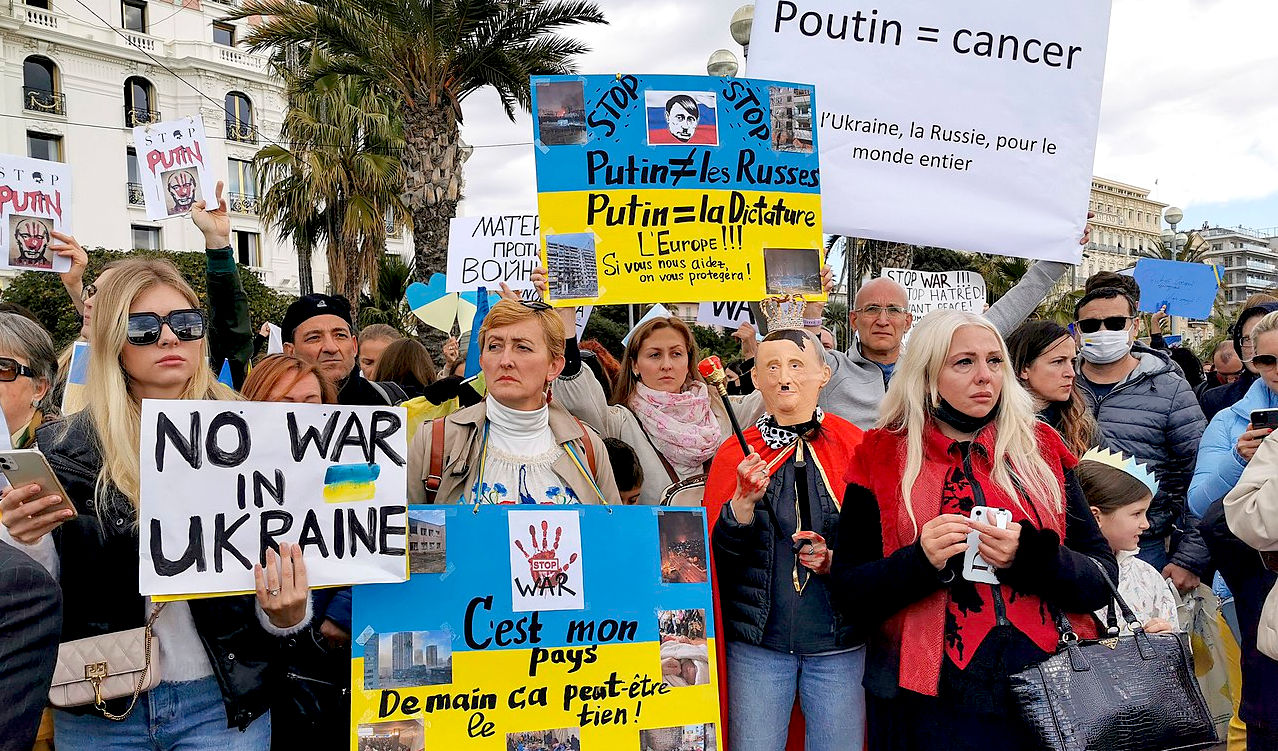
On the subject of
NATO and
climate
change, and how the war between Russia and Ukraine may be affecting
climate
change, as in escalating
global
warming. Here are some key points to consider.
We should consider some background information on
the current conflict between Russia and Ukraine, and its implications
for regional and global security, and the part of NATO in addressing
environmental challenges and climate
change, as well as the recent
Climate Change and Security Action Plan adopted by NATO Allies [1].
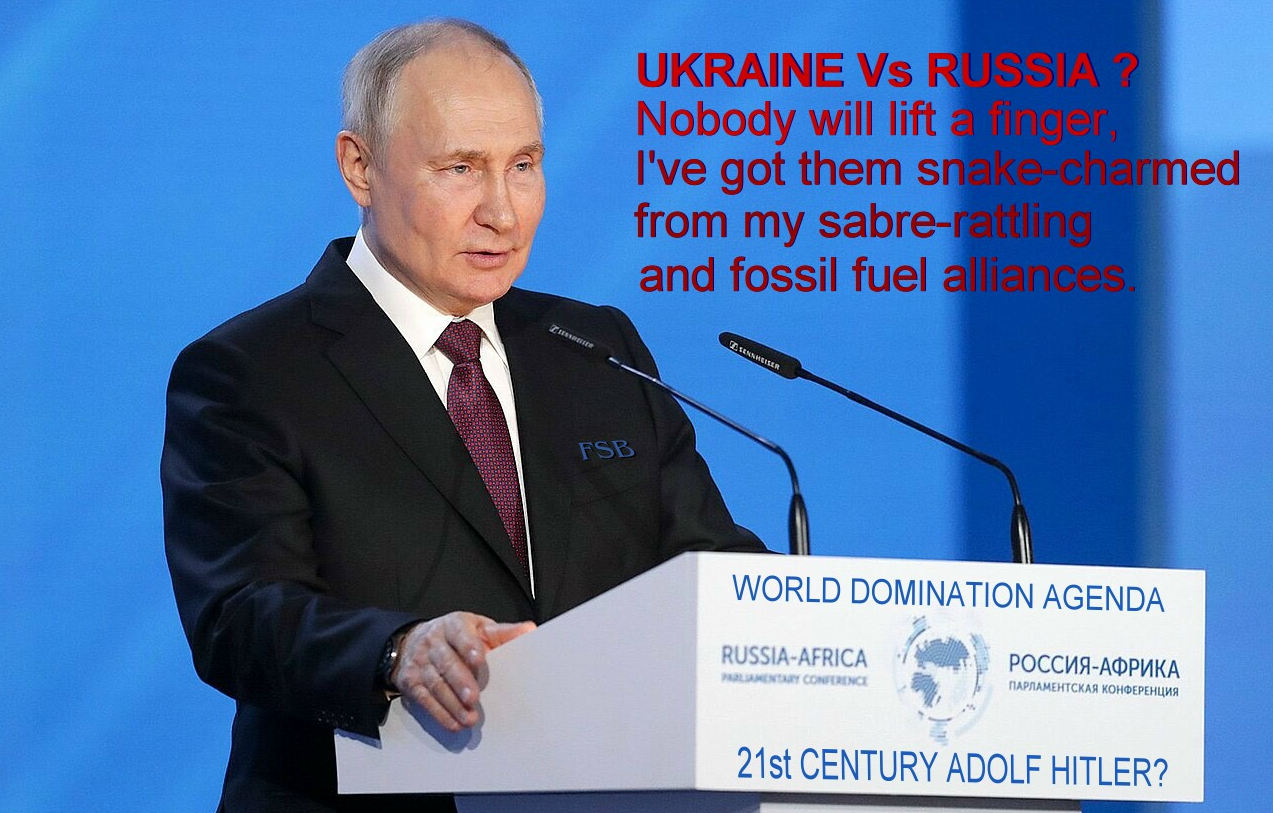
It
takes a lot of pot warming to walk into another country, so
that nobody lifts a finger. Having done it once with Crimea,
and after cajoling all the usual political allies, blinding
them with reliance on cheap fossil fuels, and how powerful
the former USSR is, with plenty of military displays and
much talk of nuclear dominance. One might imagine from
Hitler's example in Europe, with Blitzkrieg tactics, that
Putin believed Ukraine was a Cakewalk.
The International Criminal Court
(ICC), located in the Hague, is the court that prosecutes individuals for war crimes, crimes against humanity, and genocide.
As of March 6, 2024, the ICC has issued arrest warrants for two individuals in connection with the situation in
Ukraine. Vladimir Putin is accused of the war crime of unlawful deportation of children from occupied Ukrainian territories. Maria Alekseyevna
Lvova-Belova: is also accused of the responsibility for the same war crime.
It's important to note that having an arrest warrant issued doesn't equate to being declared a war criminal, it is simply an allegation. A trial would be needed to determine
guilt, and if found guilty, would then be a convicted war
criminal.
The
environmental impact of Russia’s invasion of Ukraine
has targeted Ukraine’s energy system, starting in
October 2022, has been particularly damaging to the country’s greenhouse
gas emissions,
forest
fires, oil depots, gas power plants, and renewable energy sources. You can
imagine the estimates of the first year of war’s carbon footprint in the region.
The geopolitical implications of Russia’s aggression for climate
action, the invasion of Ukraine may undermine the international cooperation and trust needed to address
climate change
effectively.
Many have compared Putin’s actions with those of
Hitler, who also used historical disquisitions and nationalist rhetoric
to justify his expansionist ambitions,
despite the efforts of the United
Nations and the Universal Declaration of Human
Rights,
that was designed by the parties to prevent such aggressions,
and a similar scenario from happening again. But here we are
again, with Putin just waiting for the right moment to take advantage
of the West's apparent weaknesses, having built up a
suitable stash of cash and arms, to wage his expansionist
plans, almost exactly as Adolf
Hitler, leading up to World
War Two.
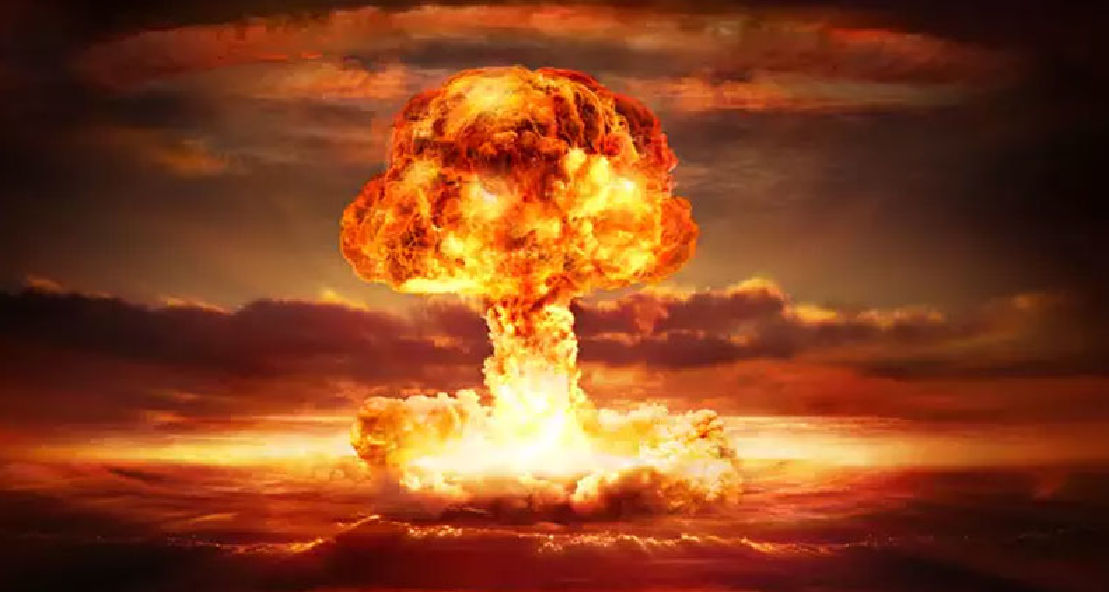
We
can thus imagine a World
War Three scenario, unless the Imperialist dictator is
stopped dead in his tracks. The problem being how to do that
without the Russian loon, from pushing the nuke button.
Clearly, his age is one trigger, lest his career dream elude him
completely as he succumbs to old age. Where he cannot be
sure his successors will be so foolhardy in the modern
internet age, knowing the Russian population
are more enlightened. And voting might actually count one
day.
Especially concerning international issues such a warming of
the planet, biological diversity and plastic pollution;
poisoning our fish stocks.
The
problem being that Vladimir Putin is a relic of the Cold
War. It appears that he cannot get his head out of that
particular cloud. Taking lessons directly from Adolf
Hitler's pocket book on world domination. On that score,
Vladimir Putin is not even original, as you might agree on
reflection of the Führer's approach.
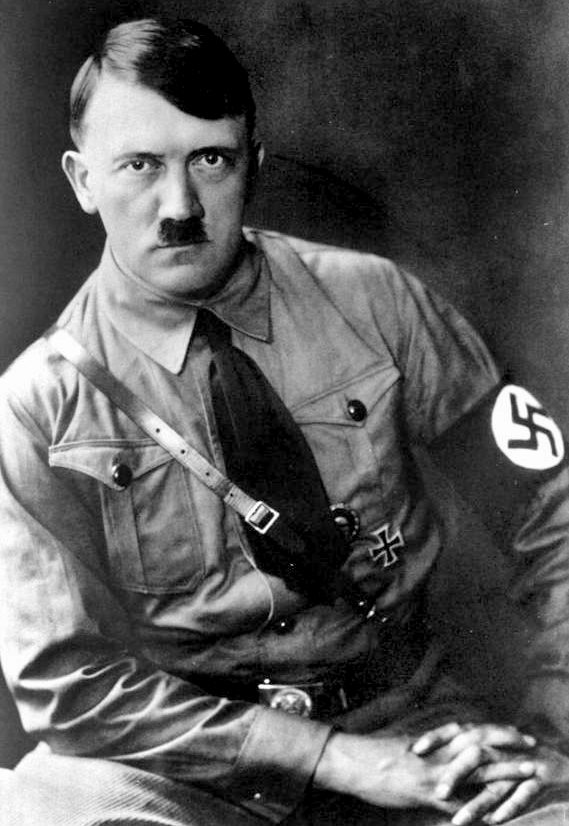
Adolf
Hitler fought in the First World
War, then took advantage of
the utter carnage of a depression, to promise the German
people the earth. There is no doubting his skills as a
master orator.
On
30 January 1939, Nazi German dictator Adolf Hitler gave a speech in the
Kroll Opera House to the Reichstag delegates, which is best known for
the prediction he made that "the annihilation of the Jewish race in
Europe" would ensue if another world war were to occur.
Nazi propaganda minister Joseph Goebbels helped
write the speech, which was delivered on the sixth anniversary of
Hitler's seizure of power in 1933. The speech lasted two or
two-and-a-half hours. It dealt with both the foreign and domestic
policies of the Nazi government.
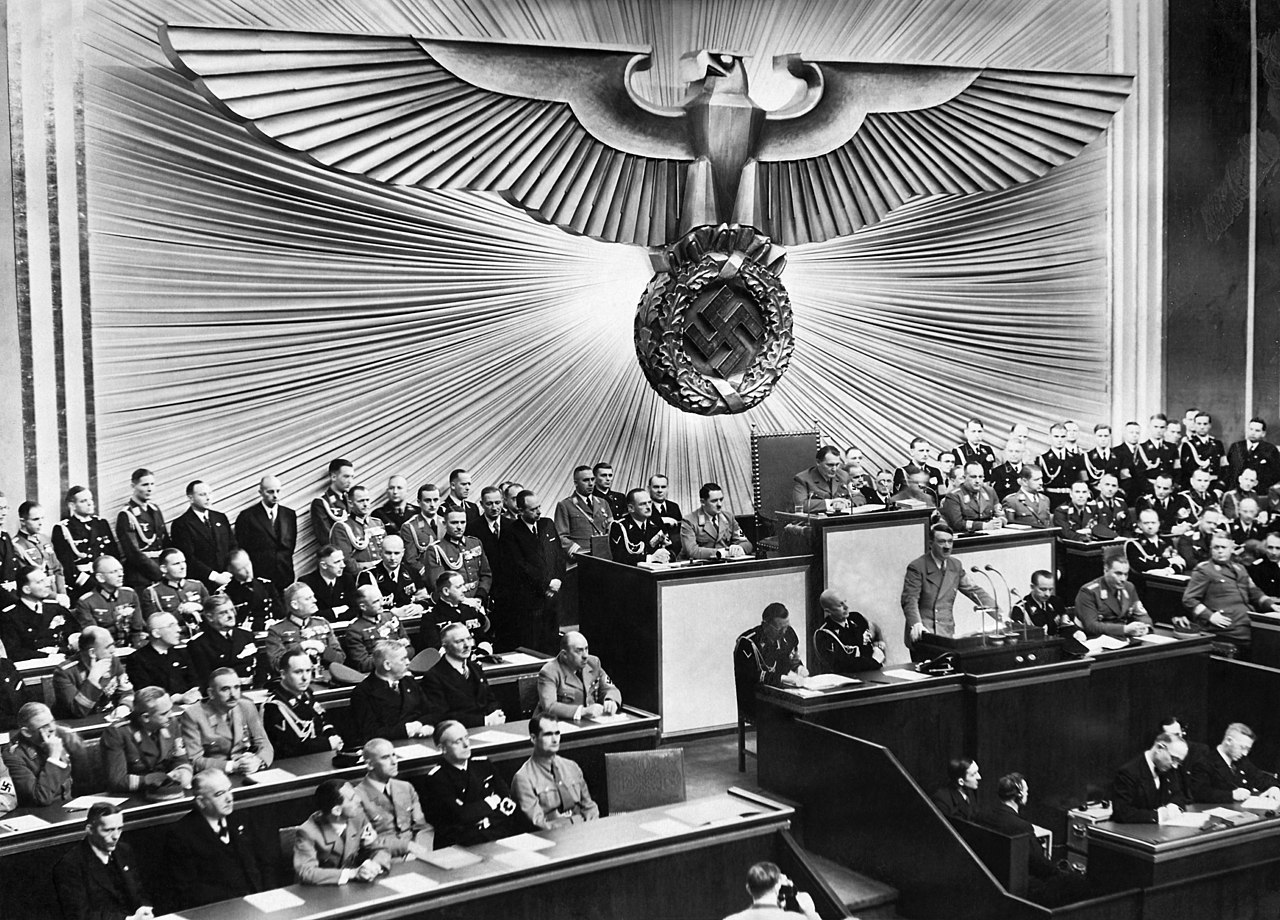
Hitler
accused Jews of having "nothing of their own, except for political and
sanitary diseases" and being parasites on the German nation, turning
Germans into "beggars in their own country". He asserted there had to be
an end to the misconception that "the good Lord had meant the Jewish
nation to live off the body and productive work of other nations", or
else the Jews would "succumb to a crisis of unimaginable severity".
Hitler claimed that the Jews were trying to incite "millions among the
masses of people into a conflict that is utterly senseless for them and
serves only Jewish interests". Hitler then arrived at his main point:
"I have very often in my lifetime been a
prophet and have been mostly derided. At the time of my struggle for
power it was in the first instance the Jewish people who only greeted
with laughter my prophecies that I would someday take over the
leadership of the state and of the entire people of Germany and then,
among other things, also bring the Jewish problem to its solution. I
believe that this hollow laughter of Jewry in Germany has already stuck
in its throat. I want today to be a prophet again: if international
finance Jewry inside and outside Europe should succeed in plunging the
nations once more into a world war, the result will be not the
Bolshevization of the earth and thereby the victory of Jewry, but the
annihilation of the Jewish race in Europe."
Today, a speech like this would be illegal. Inciting racial prejudice and hatred. He would be arrested, tried and imprisoned.
With all the build up, and wealth creation in rearming Germany, and with the help of the Gestapo, few would stand
up to be counted, for fear of being eliminated, sometimes permanently.
ADOLF
HITLER
Founder and leader of the Nazi Party, Reich Chancellor and guiding spirit of the
Third Reich
(New World Order) from 1933 to 1945, Head of State
and Supreme Commander of the Armed Forces, Adolf Hitler was born in
Braunau am Inn, Austria,
on 20 April 1889. The son of a fifty-two-year-old Austrian customs
official, Alois Schickelgruber Hitler, and his third wife, a young
peasant girl, Klara Poelzl, both from the backwoods of lower
Austria.
The
young Hitler was a resentful, discontented child. Moody, lazy, of
unstable temperament, he was deeply hostile towards his strict,
authoritarian father and strongly attached to his indulgent,
hard-working mother, whose death from
cancer in December 1908 was a shattering blow to the adolescent Hitler.
Hitler's saber-rattling tactics bludgeoned the
British and French into the humiliating Munich agreement of 1938 and the
eventual dismantlement of the Czechoslovakian State in March 1939. The
concentration
camps, the Nuremberg racial laws against the
Jews, the persecution of the churches and
political dissidents were forgotten by many Germans in the euphoria of
Hitler's territorial expansion and bloodless victories. The next
designated target for Hitler's ambitions was Poland (her independence
guaranteed by Britain and France) and, to avoid a two-front war, the
Nazi dictator signed a pact of friendship and non-aggression with Soviet Russia. On 1 September 1939 German armies invaded Poland and henceforth his main energies were devoted to the conduct of a war he had unleashed to dominate
Europe and secure Germany's "living space."
The first phase of World War II was dominated by
German Blitzkrieg tactics: sudden shock attacks against airfields,
communications, military installations, using fast mobile armor and
infantry to follow up on the first wave of bomber and fighter aircraft. Poland was overrun in less than one month, Denmark and
Norway in two months, Holland, Belgium, Luxemburg and
France in six weeks. After the fall of France in June 1940 only Great Britain stood firm.
Leading to the Battle of Britain.
The Battle of Britain, is where the Royal Air Force prevented the
Luftwaffe from securing aerial control over the
English
Channel. This was Hitler's first 'setback,' causing the planned invasion of the British Isles to be postponed.
The
'setback' for Vladimir
Putin, was the fighting spirit of the
Ukraine, at last supported by the EU and USA, where he
simply walked in Crimea, unopposed. Indeed, Putin's saber-rattling,
nuclear
rhetoric, and military displays of power (marches) have
failed. The Ukraine has a leader with gusto, the size of a
brass space-hopper.
Depending
on his mood swings and level or perceived desperation, the 'Red Peril' may finally punch the nuclear bag. We imagine this
threat is real, spoken of many times as a threat in case
Russia starts losing ground seriously, politically and
geographically. Meaning that everyone, all over the world
should not be shocked if it happens, and should be preparing
for the worst case scenario. Mainly, to ensure survival in
sufficient numbers to be able to stage a comeback. Not to
waste that opportunity, should the indescribable be forced
upon us.
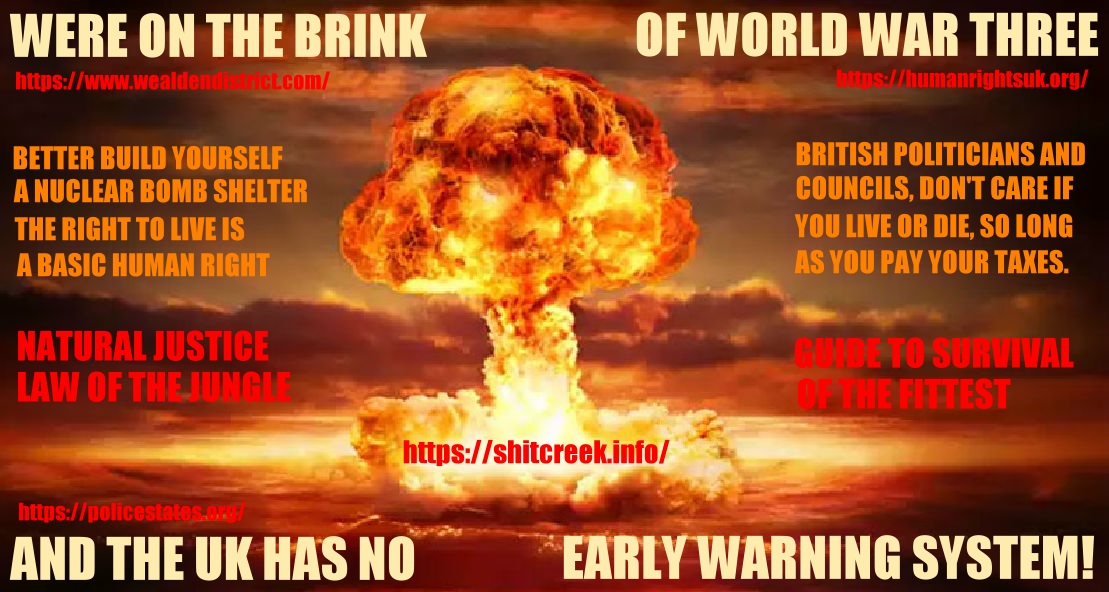
Take
a leaf out of the Hiroshima and Nagasaki
bombs, that effectively ended WW2. If Putin is rash enough
to unleash thermonuclear hell, the West should take that
opportunity to completely neutralize the Russian threat, so
sending a clear message to potentially fanatical adversaries
like Iran and North Korea. No matter what the cost. It will
be cheaper for planet
earth in the long run.
Indeed,
as allies of Russia, Iran and North Korea may care to enjoin. Giving the
remainder of the developed world, NATO allies and even UK
allies who are not members of NATO, the opportunity to
obliterate those threats. From which (relatively) clean
slate, the world, as Nations
United, might rebuild from a more stable starting point.
Barren, but stable; a clean canvas. Unthinkable that such a confrontation represents, every
cloud has a silver lining. Leaving only China and India, to
come to terms with. Who may then see reason, in curtailing
their present nuclear ambitions. Not least because the cheap
coal, gas and oil will have evaporated. Putting their
economies into a nose dive, save for rice, tea and spices as
exports. But when? When will the land be washed sufficiently
to farm, and how many farmers will be able bodied enough to
tend the crops?
Fingers
crossed, the world will not be too polluted, and that any
nuclear winter might be survivable. Though this goes against
all that the Cleaner Ocean Foundation stands
for, in the
real world, one should be prepared. In the words of Sir
Winston Churchill: "Speak softly, but carry a
big stick."
What
is clear, is that any nation treading a similar path to Adolf
Hitler, will eventually come up against some serious
competition for survival. In any nuclear conflict, cannibalism
will be rife. Pork
pie anyone?

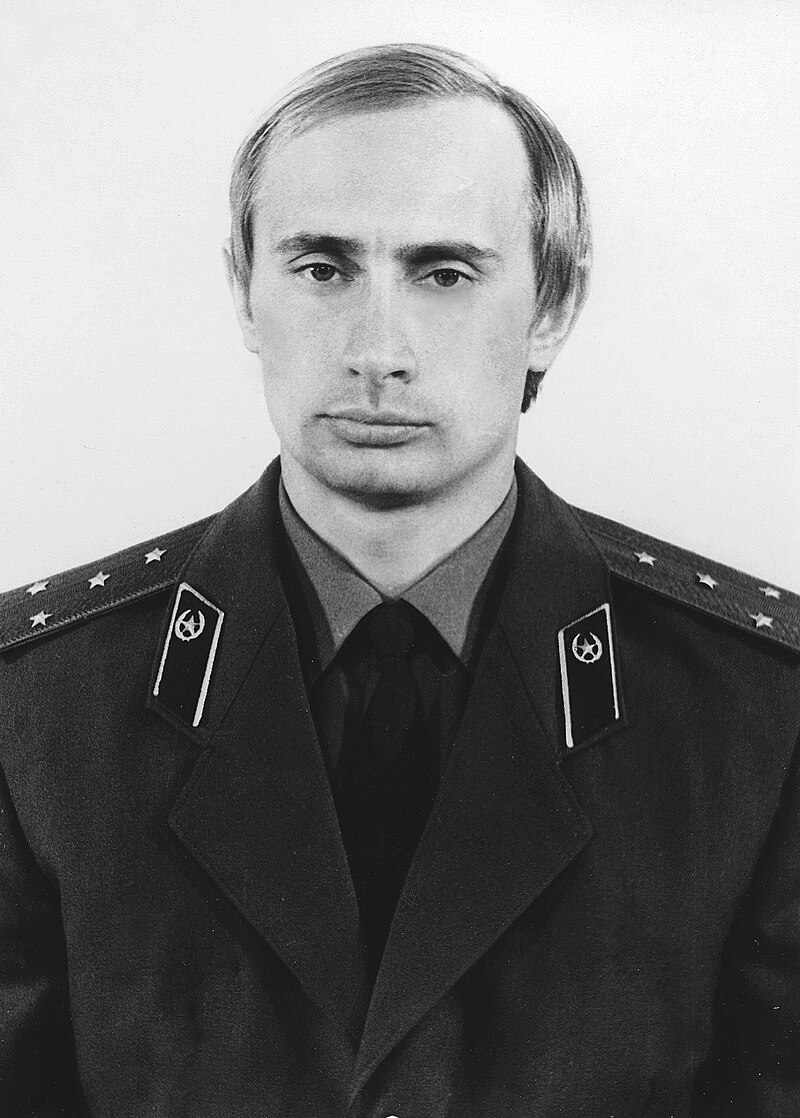
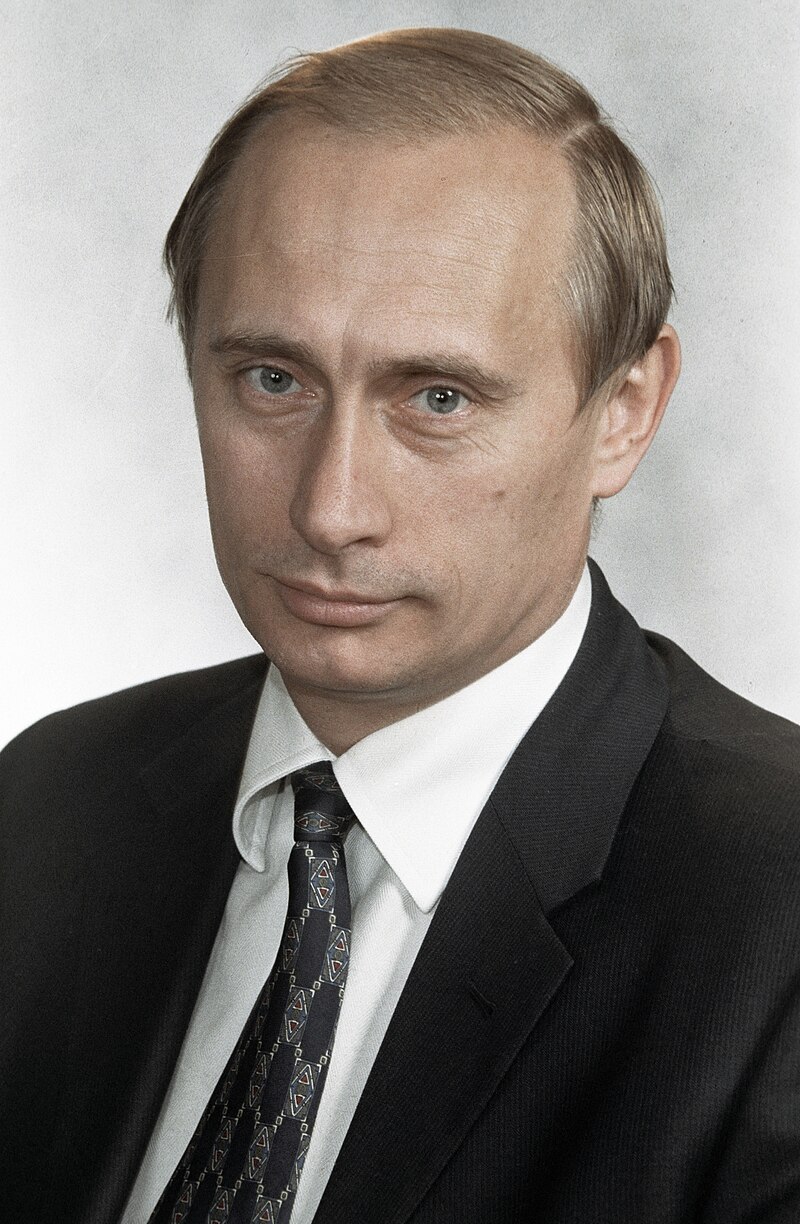
Portrait
of a war criminal, trained by Russian's secret service,
where their job constituted an apprenticeship for what was
to come, the mass murder of Ukrainian citizens, as a
butchering psychopath. Vladimir Putin is pictured above as a
child, and then clawing his way up the power ladder as a
KGB officer, with who knows how many assassinations ordered
by his then superiors, or himself, along the way, as he developed a
circle of alliances based on fear. The KGB being the right
training ground for political success, for those ruthless
enough to quash opposition the old fashioned way. Much as
with Adolf Hitler and his Gestapo. That is why it is
dangerous to keep anyone in any position of power for too long.
Change is essential to prevent cozy relationships developing
into a full blown dictatorship. And that means free
elections is a true democracy, with complete transparency. The only exceptions to this
rule, being a few very well balanced individuals, who don't
have an axe to grind, and respect geographical boundaries.
Holding life to be precious, and human rights sacrosanct.
The
KGB was a military service governed by army laws and regulations, in
the same fashion as the Soviet Army or the MVD Internal Troops. While
most of the KGB archives remain classified, two online documentary
sources are available. Its main functions were foreign intelligence,
counter-intelligence, operative-investigative activities, guarding the
state border of the USSR, guarding the leadership of the Central
Committee of the Communist Party and the Soviet Government, organization
and security of government communications as well as combating
nationalist, dissident, religious and anti-Soviet activities. On 3
December 1991, the KGB was officially dissolved. It was later succeeded
in Russia by the Foreign Intelligence Service (SVR) and what would later
become the Federal Security Service (FSB). After becoming president,
Vladimir Putin launched a major reorganization of the FSB. First, the
FSB was placed under direct control of the President by a decree issued
on 17 May 2000.
SURVIVING
A NUCLEAR HOLOCAUST
While
the threat of nuclear war is a critical concern, it's important to
understand that preventing nuclear conflict is paramount, the exception being
when fired upon, thus a retaliatory second strike and up to
date defence system is essential.
A
nuclear winter
is a hypothetical scenario with devastating consequences, and preparing
for it can only offer limited and uncertain benefits in the face of an
event that must first be actively prevented through diplomacy and global
cooperation, if at all possible.
However, if the unthinkable were to happen, it's
crucial to note that there is no guaranteed way to survive a nuclear
winter. There are no grants for bunkers or stocks of food.
The severity of its impact would depend on numerous factors,
including the scale of the nuclear exchange and the prevailing
environmental conditions.
If Iran and North Korea don't turn chicken, the thermonuclear fallout will be expansive, potentially all
encompassing. Meaning longer in bunkers, on stored foods and H2O.
That the ordinary citizen cannot afford. And the armed
forces have not provided or stocked for sufficient after
event combat. Presumably, if an aggressor is nutty enough to
push the red button, they will have a follow up invasion
plan.
Here are some general precautions that might be considered if such a catastrophic event were to occur:
Immediate Shelter:
1. Seek immediate shelter in a subterranean location like a basement, underground bunker, or subway station. These
offer some protection from the initial blast, heat, and radiation.
2. Remain indoors for at least 24-48 hours as this allows
radioactive fallout to settle, significantly reducing its immediate threat.
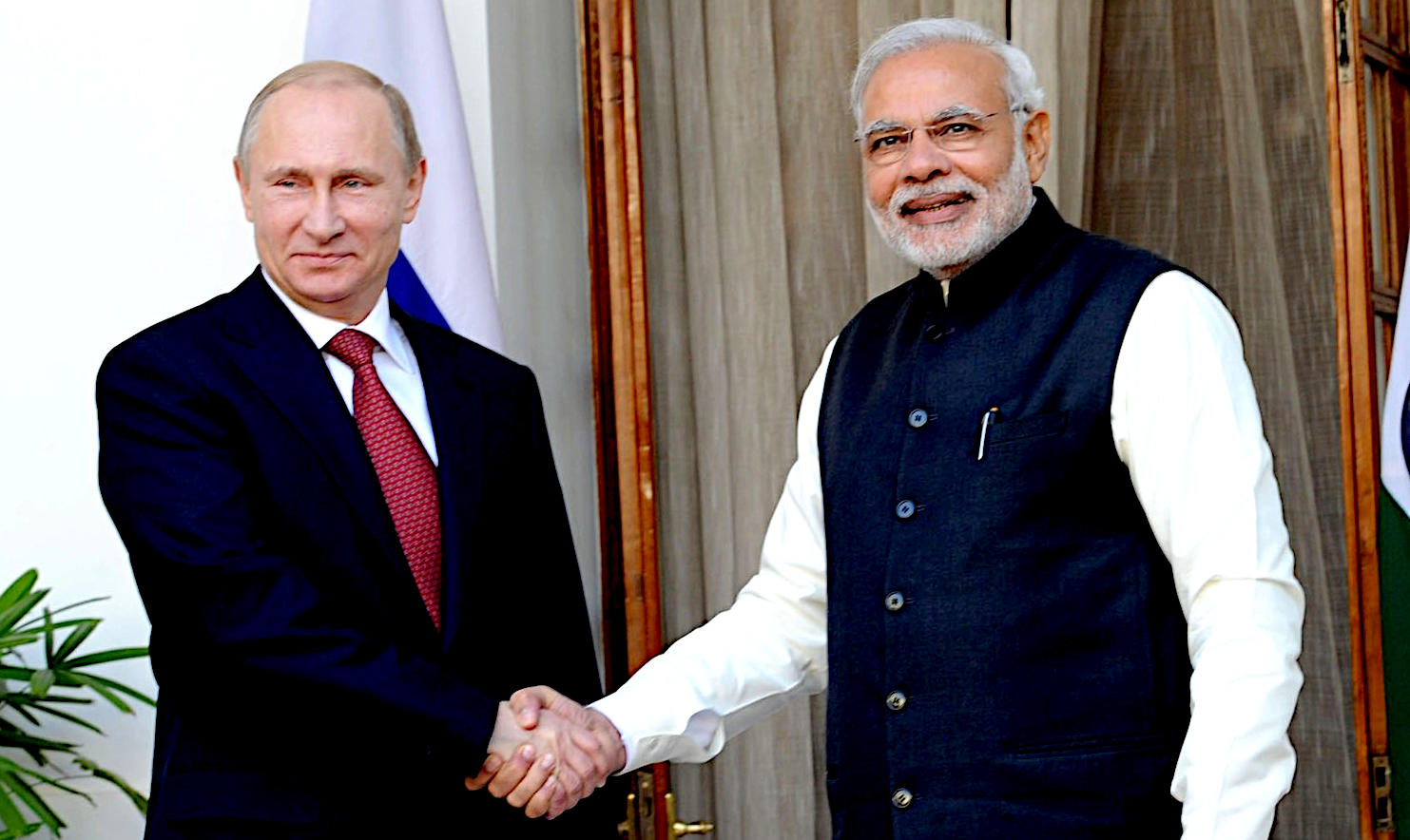
Vladimir
Putin and Narendra Modi, no doubt shaking hands on some
deal, one of which could have been the continued supply of
fossil fuels to underpin the rapid industrial expansion of
India's economy, nuclear navy and space program. Despite,
those exports financing Russia's invasion of Ukraine. Does
that make India an enemy and a risk?
Long-Term Survival:
- Food and water stockpiles: Having access to non-perishable
food and
water is crucial for long-term survival. Aim for a minimum of two weeks' supply per person, and ideally much longer if possible.
- Air filtration: Filtering the air you breathe is essential as radioactive dust can be present for weeks or months.
Consider purchasing HEPA filters or improvising filtration systems using available materials.
- Medical supplies: Maintaining a basic stock of first-aid and medical supplies is important to address potential
injuries and illnesses.
- Community and communication: Establishing communication channels and cooperating with others is crucial for
sharing resources, information, and emotional support.
It's crucial to emphasize that these measures are highly speculative and offer no guarantee of survival. The consequences
of a nuclear winter would be catastrophic, with widespread environmental damage,
food
shortages, and societal collapse.
Therefore, preventing nuclear war is the only truly effective way to avoid the horrors of nuclear winter. This necessitates
continued efforts towards diplomacy, non-proliferation, and risk reduction. Individuals can contribute by supporting organizations dedicated to
peace-building and global security and advocating for policies that promote dialogue and understanding between nations.
The war between
Russia and Ukraine has undoubtedly presented a complex situation for
NATO member nations, with potential implications for both climate change
and defence spending. Let's
take a look at some of the main points.
CLIMATE CHANGE
Increased Focus on Energy Security: The
war has exposed Europe's dependence on Russian energy sources,
particularly natural gas. This has sparked renewed efforts to diversify
energy supplies and accelerate the transition to renewable energy
sources. While this long-term shift could ultimately benefit climate
change mitigation, short-term solutions might involve increased reliance
on fossil fuels from other sources, potentially offsetting some of the
progress made on emissions reduction.
Potential Disruption of Climate Action: The war is diverting significant resources and attention from other pressing global issues, including
climate
change. This could disrupt international
cooperation on climate action initiatives and hinder progress towards
achieving emissions reduction targets.
DEFENCE SPENDING
Increased Defence Expenditure: The war
has heightened security concerns among NATO members, leading to calls
for increased defence spending. Many member states have committed to
raising their defence budgets to meet the alliance's target of spending
2% of GDP on defence. This shift in resources towards defence comes at
the expense of other budgetary priorities, potentially including
investments in climate change initiatives.
Potential Long-Term Impacts:
The war could have long-term consequences for NATO's strategic
direction. If the conflict persists or escalates, it may necessitate
continued high levels of defence spending, creating a persistent tension
between
security needs and climate action.
MEMBER
NATIONS PERSPECTIVES
Balancing Act: Member nations face the
challenge of balancing their response to the war with their commitments
to address climate change. This could involve seeking solutions that
address immediate security concerns while still promoting long-term
sustainability.
Diversity of Views:
There will likely be divergences in member states' perspectives on how
best to navigate this complex situation. Some countries might prioritize
immediate security needs, while others might emphasize the importance
of maintaining focus on climate action.
It is important to note that this is a rapidly
evolving situation, and the long-term consequences of the war for NATO
and climate change are still uncertain. However, the above points
highlight some of the potential challenges and opportunities that the
war presents for member nations.
It's also worth noting that some argue that increased defence spending can coexist with
climate
action.
Some propose investing in "green
defence" technologies to improve efficiency and minimize environmental
impact. Additionally, some believe that by addressing the root causes of
conflict, such as
poverty and resource scarcity, NATO can contribute to a more stable and
sustainable future.
Ultimately, how individual member nations and NATO as a whole
navigate this complex situation will depend on their evolving priorities and the trajectory of the war in
Ukraine.
Ukraine
represents the fight for freedom and the rights of every
human to live a full life, free from oppression.
https://www.nato.int/cps/en/natohq/news_223084.htm
https://www.nato.int/cps/en/natohq/news_223084.htm
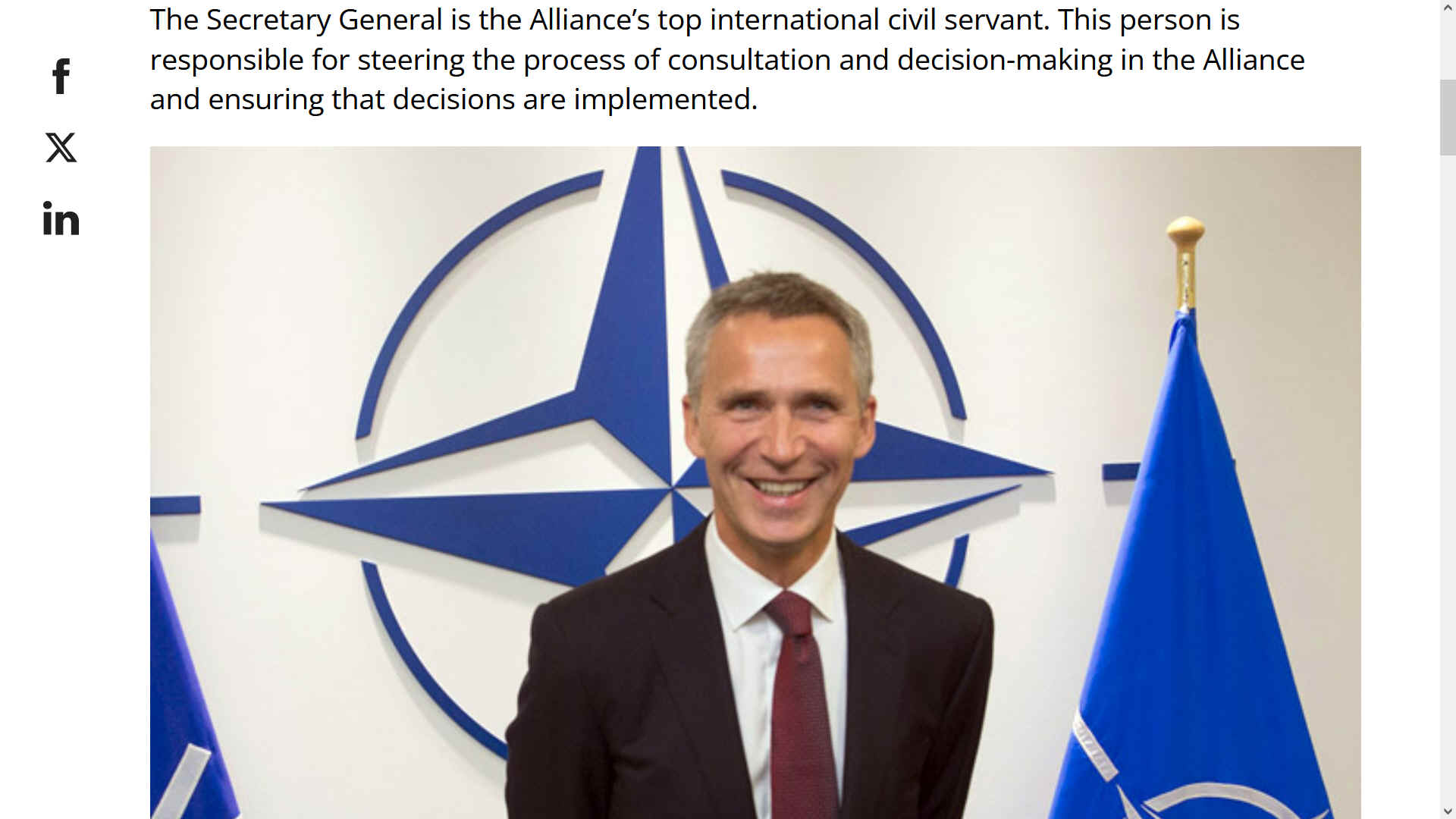
NATO
CONTACTS
At present, NATO has 31 member countries. These
countries, called NATO Allies, are sovereign states that come together
through NATO to discuss political and security issues and make
collective decisions by consensus.
NATO was created by 12 countries from Europe and North America
on 4 April 1949. Since then, 19 more countries have joined NATO through
nine rounds of enlargement (in 1952, 1955, 1982, 1999, 2004, 2009,
2017, 2020 and 2023). Article 10 of the North
Atlantic
Treaty sets out how countries can join the Alliance. It states that
membership is open to any "European State in a position to further the
principles of this Treaty and to contribute to the security of the North
Atlantic area".
Any decision to invite a country to join the Alliance is taken by the North
Atlantic Council, NATO's principal political decision-making body, on the basis of consensus among all Allies.
The Secretary General is the principal spokesperson
of the Alliance and represents the Alliance in public on behalf of the
member countries, reflecting their common positions on political issues.
The post is currently held by Jens Stoltenberg,
former Prime Minister of Norway, who took up his responsibilities on 1
October 2014.
https://www.nato.int/
https://www.nato.int/
